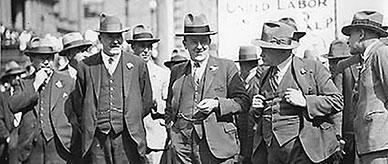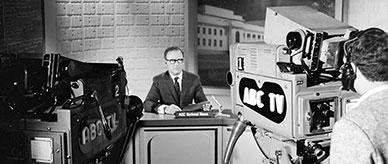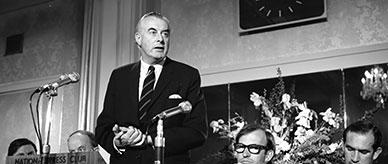
Transcript
Joseph Lyons: Good evening, listeners. The wheel of time has turned another cycle. We turn our backs on a year that has passed and we face the year that is to come.
For the old year most of us I suppose will have our regrets. Regrets and unavoidable happenings, regrets at things which we, had we known better, might have avoided. We have made our mistakes. Every one of us, else we would not be human. But I trust that in the balance of things it will be found that the good we have done – or striven to do – has outweighed the errors. In any case we should cast regrets aside, for they help us little and may do us great harm.
For many, I know only too well, 1934 has been a year of trial. To many it has brought suffering; to these, words can be of small comfort, but I cannot refrain from expressing my unbounded admiration for the manner in which thousands of our people have borne their sufferings with fortitude, have faced life and its problems so courageously. The world these days seems to be out of joint in many respects and the economic crisis through which we have been passing has left its mark.
But I believe that the Australian people by their determination to face facts, by their refusal to take the easy road, by their sacrifices have won to a position which is the envy of the world.
To them, to you who are listening tonight, we owe our thanks. The road to economic recovery is painful but I have not a doubt that the road the Australian people have taken is the correct one and that its goal will be worth the effort of attaining it.
We have done much but every day new problems face us and the coming year will bring new anxieties, new tangles of the threads of economic life which have to be unravelled. It will bring problems which will tax all the ingenuity and patience of Australia’s leaders. And to the people I say, have faith in your leaders and by your confidence in them inspire them to do great things for your country. With the people behind them, they can achieve much. Let the people then show to the world that Australia, as a nation, faces unitedly the issues ahead.
I trust that God will shower upon the people individually all his choicest blessings and that true happiness will be the lot of each.
For those who have known sorrow in the past year I pray that there will be better times ahead. For those who have been more fortunate I pray that there will be a continuance of good fortune. And I would conclude with the words of Robert Louis Stevenson ‘To travel hopefully is a better thing than to arrive and the true success is to labour’.
Good night and a happy new year to you all.
[END]
About this record
This spoken word gramophone disc recording is a four-minute New Year address by Prime Minister Joseph Lyons to the Australian people. It was broadcast on 12 December 1934 by the Australian Broadcasting Commission (the ABC). Lyons’s speech reviews the previous year. Written during the Great Depression, Lyons acknowledges the suffering and sorrow that some people have experienced. He expresses faith in the public and asks them to place their faith in their leaders. The speech concludes with a quote by Robert Louis Stevenson about the importance of hope.
Lyons's speech was seen as an unusually honest assessment of the past year. The Labor Daily newspaper, generally a critic of Lyons's conservative United Australia Party (UAP) government, described it as 'the most extraordinary broadcast address of all time'.
This broadcast attempted to address the despair felt by many Australians during the period of the nation's greatest economic hardship. The global Great Depression, which had followed the collapse of the Wall Street stock market in 1929, caused bank failures, a collapse of investment, mounting unemployment, falling commodity prices and sharp falls in international trade.
The Great Depression had caused many Australians to lose their jobs in an era in which government benefits for the unemployed were limited, causing significant poverty and hardship. By mid-1932, 29 per cent of the Australian workforce was unemployed and many Australian families were forced to live in exceptionally difficult circumstances, losing homes and income.
Lyons encourages his audience to be hopeful but he gives few reasons for feeling optimistic. Lyons's government believed in the importance of repaying international debt and in balancing the budget. Economists such as John Maynard Keynes advocated deficit financing—stimulating the economy through government spending and paying back the debt when the economy recovered. Lyons’s government disagreed with this approach, however, and recovery, while steady, was therefore slow during his terms in office.
Lyons had been acting federal Treasurer for a short period in the Scullin Labor government (1929–32) but he left in 1931 because of intra-party disagreements about how to deal with the economic crisis. The Scullin government was divided between those who advocated increased government spending, those who believed Australia should default on its international debt and Lyons's own more orthodox and cautious views.
Lyons became Prime Minister in 1932 as the leader of the newly formed UAP, which brought together former Labor Party members who preferred a more conservative approach to the economy, and the Nationalist Party.
Dubbed 'Honest Joe', Joseph Lyons (Prime Minister from 1932 to 1939) was popular with the electorate and widely seen as pursuing a safe fiscal policy. He made this speech about three months after his victory in the September 1934 federal election, the second of three consecutive terms. By 1937, the year Lyons won his third term, unemployment had dropped to below 10 per cent. Although this was still high, and many Australians continued to endure hardship, Lyons was given credit for the improvement.
Acknowledgments
Learning resource text © Education Services Australia Limited and the National Archives of Australia 2010.
Related themes
Need help with your research?
Learn how to interpret primary sources, use our collection and more.



